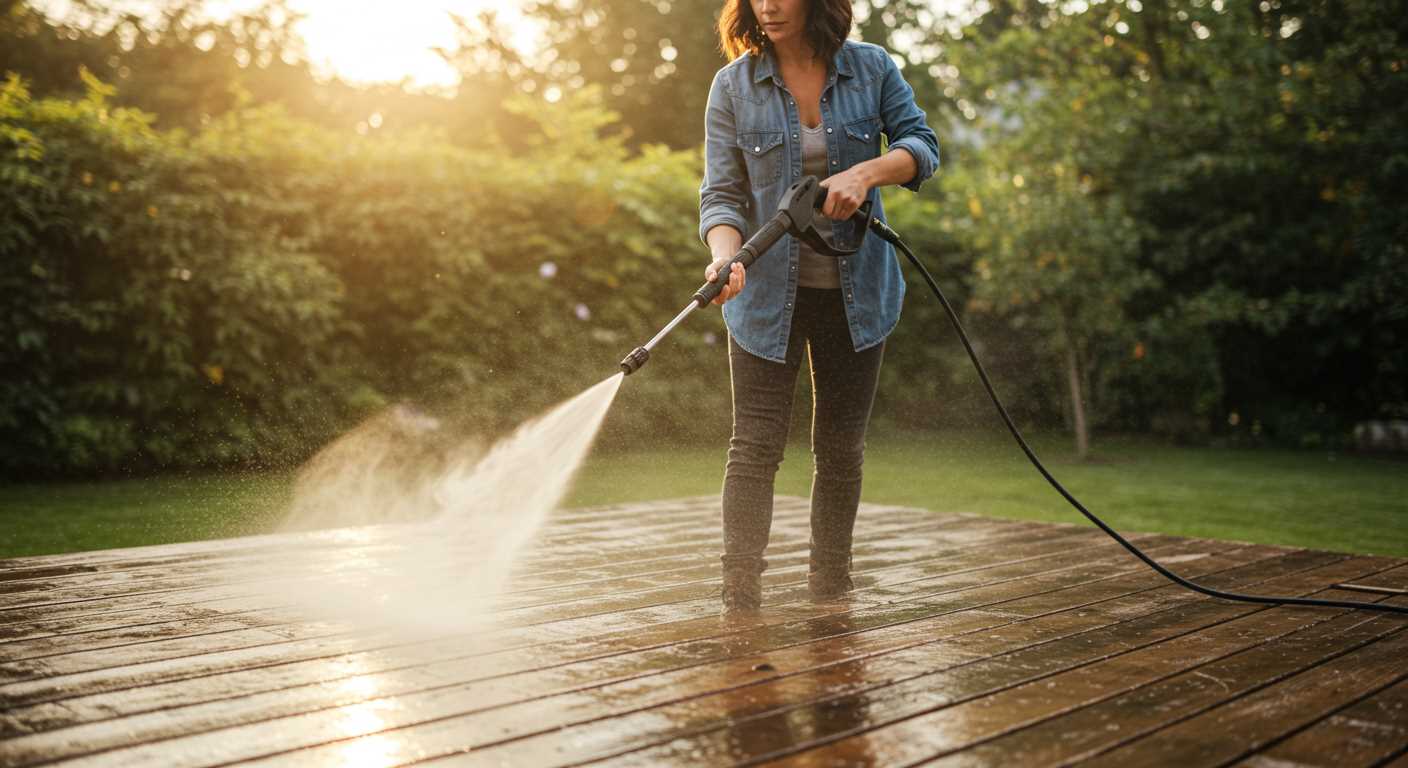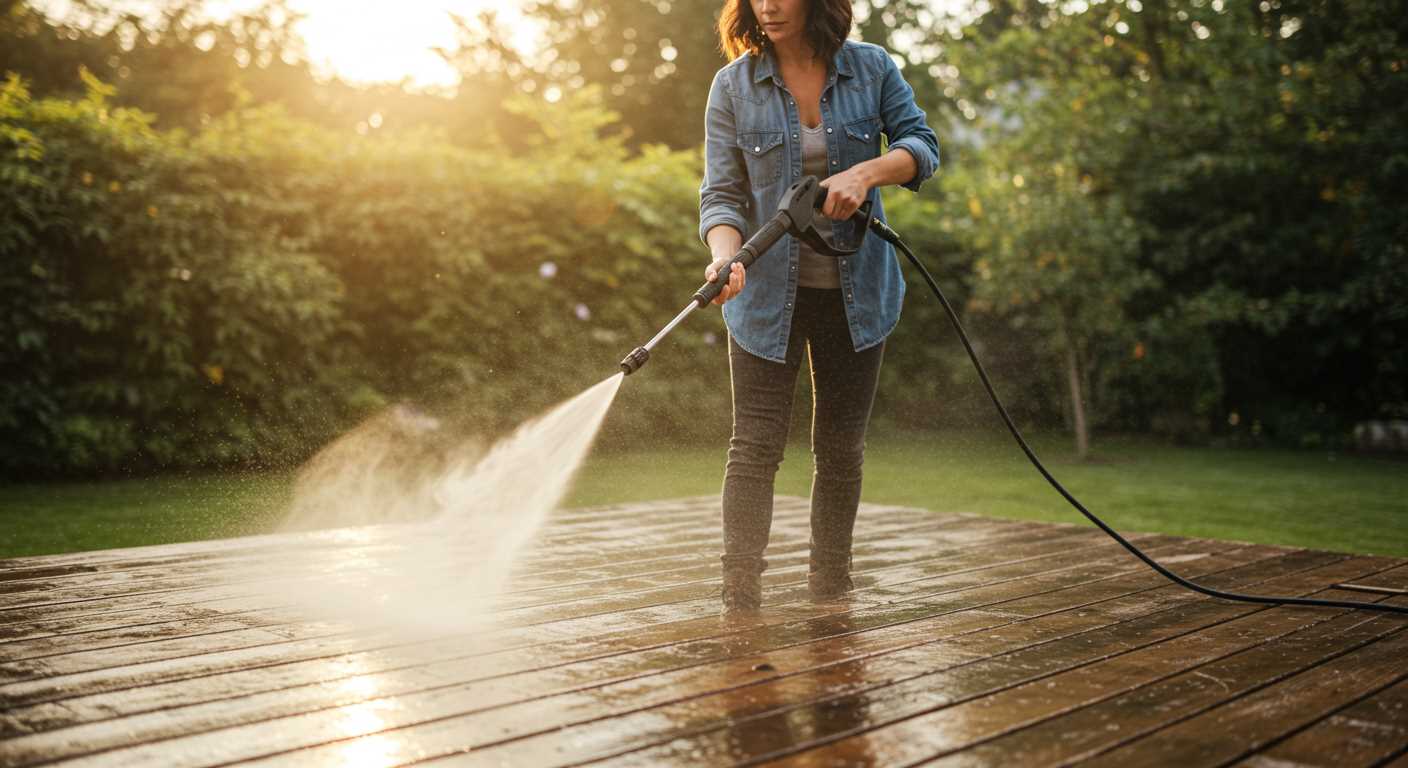




Absolutely, using soap can enhance the cleaning process significantly. When I first started working with various models, I quickly realised that certain surfaces, like patios or vehicles, respond much better to a cleaning solution. This is because stubborn grime often requires more than just water pressure to break down effectively.
During my time as a consultant, I discovered that not all formulations are created equal. Some cleaning agents are specifically designed to tackle mildew, oil, or grease. For example, I remember testing a biodegradable solution that worked wonders on my own driveway, lifting years of built-up dirt effortlessly. It was a revelation to see how the right product could make such a difference.
Of course, it’s important to choose the right type of cleaner for the job. I often recommend checking the manufacturer’s guidelines for compatibility. Some devices come with attachments that allow for easy application of cleaning solutions, which can save time and effort. From my experience, using the appropriate cleaner not only improves results but can also prolong the life of your equipment by reducing wear and tear.
Do Pressure Cleaners Require Soap?
Yes, utilising a cleaning solution can significantly enhance the cleaning process. Certain circumstances demand a specialised cleaner to tackle stubborn grime or stains effectively.
Specific Scenarios for Using Cleaning Solutions
- Oil and Grease: When dealing with surfaces marked by oil or grease, a dedicated formulation can penetrate and break down these substances more efficiently than water alone.
- Mould and Mildew: For outdoor surfaces, such as patios or decks, where mould or mildew is present, using an appropriate cleaner can help eliminate these growths and prevent their return.
- Paint Removal: If your task involves stripping paint, a specific solvent will assist in softening the old paint, making it easier to remove.
Types of Cleaning Agents
- Biodegradable Cleaners: These are environmentally friendly options that break down naturally and are safe for plants and wildlife.
- Concentrated Solutions: Often more potent, concentrated cleaners require dilution and can save you money in the long run.
- Foaming Agents: They cling to vertical surfaces longer, allowing for deeper penetration and more effective removal of dirt and grime.
When using a cleaner, follow the manufacturer’s instructions for dilution and application. It’s crucial to select a product compatible with your equipment to prevent damage or voiding warranties. Remember, not every job necessitates a cleaning agent, but for those tricky situations, having the right solution can make all the difference.
Understanding the Role of Soap in High-Pressure Cleaning
In my experience, incorporating soap into your cleaning routine can significantly enhance the outcome. When tackling stubborn grime, oils, or mildew, the right cleaning solution can break down these tough substances more effectively than water alone. For instance, I remember a particularly challenging job involving an old wooden deck. Without a quality cleaning agent, I would have spent hours scrubbing with little to show for it.
Using a suitable cleaning solution allows the mixture to cling to surfaces longer, providing time for it to penetrate and dissolve dirt. This is especially beneficial on vertical surfaces like walls or fences. I once used a specially formulated cleaner on a concrete driveway, and the results were impressive, with a noticeable difference after a single application.
When selecting a cleaning agent, consider the material you are working with. For instance, a gentle solution is ideal for delicate surfaces like painted wood, while a more robust formula is necessary for concrete or metal. I’ve learned that using the wrong product can lead to damage, so always check the manufacturer’s recommendations.
Storage of your equipment also matters. To protect your gear, investing in a quality pressure washer cover can prolong its lifespan and maintain its performance. I’ve seen too many units fall victim to the elements simply due to inadequate protection.
In summary, incorporating the right cleaning solution into your routine can drastically improve results, especially on challenging surfaces. Understanding the properties of these agents and using them wisely will lead to more satisfying outcomes in your cleaning projects.
When to Use Cleaning Solutions with Your High-Pressure Equipment
Utilising cleaning agents can significantly enhance the results of your outdoor cleaning tasks. I’ve found that specific scenarios warrant their use, primarily when dealing with stubborn grime, mould, or mildew. For instance, when tackling a patio or driveway that hasn’t been maintained in years, a concentrated formula can penetrate deep into the stains, making it easier to lift them away.
Surface Type Matters
Different surfaces react uniquely to various cleaning solutions. For example, wooden decks typically require a gentle approach. Using a mild cleaning agent designed for wood can prevent damage while effectively removing dirt without compromising the surface integrity. On the other hand, concrete or brick surfaces can handle stronger mixtures, allowing for deeper cleaning without worry.
Seasonal Considerations
In spring, after a long winter, your exterior surfaces may be coated in dirt and organic debris. This is an excellent time to incorporate a cleaning solution to restore your outdoor space. I remember one spring, I used a specially formulated solution to rejuvenate my patio. The results were astonishing; the surface looked brand new, and the neighbours were impressed. Conversely, during dry summer months, a simple rinse with water might suffice, but if you notice stubborn spots, don’t hesitate to add a cleaning agent to your arsenal.
Always follow the manufacturer’s instructions regarding mixing ratios and application methods for optimal results. Using the right approach will not only save you time but will also extend the lifespan of your surfaces.
Types of Detergents Compatible with Pressure Washers
Choosing the right cleaning solution can make a significant difference in your cleaning results. Based on my experience, I’ve come across several types of formulations that work exceptionally well with high-powered cleaning units.
First up, you have alkaline-based solutions. These are fantastic for tackling oily and greasy stains, especially on driveways or garage floors. I recall a time when I had a stubborn oil stain in my workshop; an alkaline cleaner worked wonders, breaking down the grease effectively.
Then there are acidic formulations, which excel at removing mineral deposits, rust, and hard water stains. I once dealt with a boat that had accumulated a lot of calcium buildup. An acidic cleaner helped restore its shine in no time.
Enzyme-based cleaners are also worth considering. They use natural enzymes to break down organic materials like mould, mildew, and food residues. I was pleasantly surprised by how well it worked on my outdoor furniture, which had been neglected for a season.
Multi-surface solutions are versatile and can be used on various materials, including wood, concrete, and metal. I often recommend these to people who want a one-size-fits-all approach. They save time and effort, especially for larger cleaning tasks.
Lastly, there are eco-friendly options. These formulations are designed to be biodegradable and less harmful to the environment. I’ve tested a few, and while some may not be as potent as their chemical counterparts, they still do a commendable job, especially for light cleaning tasks.
In conclusion, selecting the right type of cleaning solution enhances your cleaning experience and ensures you get the best results for your specific needs. Always check compatibility with your equipment before using any product to avoid damage.
How to Properly Apply Detergent During Pressure Washing
For optimal results, always pre-treat surfaces before using a high-powered cleaning machine. I recommend using a low-pressure setting to apply the cleaning solution evenly across the area. This ensures that the solution penetrates any dirt or grime effectively.
Begin by diluting the cleaning agent according to the manufacturer’s instructions. Many formulations require mixing with water in specific ratios to achieve maximum cleaning power. I’ve seen firsthand how following these guidelines can significantly enhance performance.
Use a dedicated downstream injector if available. This allows for easy mixing of the cleaning solution with the water stream. It’s a game changer–this method ensures that the mix is consistent and applied uniformly. I’ve often found that this technique reduces the need for repetitive applications.
Apply the solution from the bottom up, working to the top of the surface. This prevents streaking and allows the cleaner to sit longer on the surface, breaking down stubborn stains. I’ve learned that letting the mixture dwell for about 5 to 10 minutes can yield impressive results. Just be sure not to let it dry out; if that happens, reapply the mixture.
Always rinse thoroughly after the cleaning agent has done its job. A strong rinse not only removes the cleaning solution but also any loosened debris. I usually recommend using a higher pressure for this final step to ensure all residues are eliminated.
Finally, clean your equipment after use. Residual cleaning solutions can clog the system, leading to performance issues in future tasks. I’ve seen countless machines suffer from neglect in this area, and a simple rinse can extend their lifespan significantly.
Benefits of Using Detergent in Specific Cleaning Tasks
In my years dealing with various cleaning scenarios, I discovered that certain tasks greatly benefit from the inclusion of cleaning solutions. For instance, tackling greasy surfaces like driveways or barbecue grills can be a nightmare without the right products. The emulsifying properties of these solutions break down grime effectively, making the removal process quicker and less labour-intensive.
Targeting Stubborn Stains
When dealing with tough stains, such as oil or rust, using a cleaning solution designed for the job can save a significant amount of time. I recall a particularly challenging situation with an old patio that had years of accumulated dirt and grease. A few spritzes of an appropriate cleaner allowed me to lift the stains with minimal effort. This not only enhanced the final appearance but also prevented damage to the surface due to excessive scrubbing.
Enhancing Overall Cleanliness
Another advantage I found is the ability of these products to provide a deeper clean. Surfaces often retain residues that a simple rinse cannot eliminate. By applying a suitable cleaning agent, I noticed that not only were the surfaces cleaner, but they also stayed cleaner for longer. It’s a simple method to enhance the longevity of outdoor surfaces.
For those who also use steam cleaning equipment, maintaining cleanliness is crucial. If you ever need guidance on maintenance, check out this link on how to clean nozzle on shark steam mop. A clean nozzle ensures optimal performance, just like a well-chosen cleaning solution ensures effective surface treatment.
Potential Risks of Using Detergent with Pressure Washers
Using cleaning solutions can lead to unintended consequences if not approached with caution. From my experience, I’ve encountered various risks that arise when incorporating these substances into your cleaning routine. Here are the key points to consider.
Compatibility Issues
Not every formulation is suitable for all cleaning devices. Some mixtures can cause damage to the internal components, leading to costly repairs. Always check the manufacturer’s guidelines before selecting a cleaning agent. For example, acid-based solutions may corrode metal parts, while certain surfactants can degrade seals and hoses.
Environmental Concerns
Using chemical agents indiscriminately can harm the surrounding environment. Residues may seep into soil and waterways, affecting local flora and fauna. Choose biodegradable options when possible, and ensure proper disposal of any leftover products. I’ve seen firsthand the impact of runoff from non-biodegradable substances, which can create significant ecological issues.
| Risk | Description | Recommendation |
|---|---|---|
| Equipment Damage | Chemicals can corrode or degrade parts. | Use only recommended solutions. |
| Environmental Impact | Harmful runoff can pollute ecosystems. | Opt for eco-friendly products. |
| Health Hazards | Inhalation or skin contact can cause irritation. | Wear protective gear when handling. |
Always prioritise safety by wearing gloves and goggles during application. I’ve had a few close calls with skin irritation due to careless handling. A little precaution goes a long way in preventing discomfort or injury.
FAQ:
Do I really need detergent when using a pressure washer?
Using detergent with a pressure washer can enhance cleaning effectiveness, especially for tough stains and grime. While water alone can remove dust and light dirt, detergent helps break down grease, oil, and other stubborn residues. If you’re cleaning surfaces like driveways, patios, or vehicles, a suitable detergent can make a noticeable difference in the results.
What types of detergents are safe to use with pressure washers?
It’s crucial to use detergents specifically designed for pressure washers. These detergents are formulated to work at high pressures and are typically biodegradable. Common types include car wash soaps, deck and patio cleaners, and concrete cleaners. Always check the manufacturer’s recommendations for your pressure washer to ensure compatibility.
Can I use regular household cleaners as detergent in my pressure washer?
Regular household cleaners are not recommended for pressure washers, as they can cause damage to the machine or not perform well under high pressure. Many household cleaners contain additives that may not mix well with water or could harm the seals and hoses of the pressure washer. It’s best to stick to products designed for use with pressure washers to avoid these risks.
How do I apply detergent with a pressure washer?
To apply detergent, first, ensure your pressure washer is equipped with a detergent tank or a specific nozzle for soap application. Fill the tank with the chosen detergent, then select the low-pressure setting and begin spraying the surface. Allow the detergent to sit for a few minutes to break down the dirt, then switch to a high-pressure setting to rinse it away. Always follow the instructions on the detergent label for best results.
Are there any surfaces that should not be cleaned with detergent?
Yes, certain surfaces may not require or should avoid detergent. For instance, delicate surfaces like painted wood or certain types of siding can be damaged by harsh chemicals. It’s advisable to test the detergent on a small, inconspicuous area first. Additionally, some surfaces might only need water for cleaning, so assess the situation before applying detergent.
Do I really need to use detergent with my pressure washer?
Using detergent with a pressure washer can enhance the cleaning process, especially for tough stains, grease, or mould. Detergents are formulated to break down dirt and grime more effectively than water alone. However, whether you need to use it depends on the surface you are cleaning. For light cleaning tasks, such as rinsing off dirt from a patio or car, plain water may suffice. On the other hand, for deep cleaning of surfaces like driveways or decks, a suitable detergent can make a significant difference. Always check the manufacturer’s guidelines for your pressure washer to ensure compatibility with detergents, and choose one that is appropriate for the task at hand.




.jpg)


